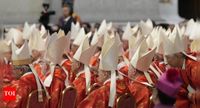As the sun rises over Vatican City, the air is thick with anticipation. The papal conclave has officially begun, marking a momentous occasion in the history of the Catholic Church. With 133 cardinals from 71 countries gathered in the Sistine Chapel, all eyes are on the chimney, eagerly awaiting the first sign of a new pope. The conclave, which started on May 7, 2025, promises to bring unpredictable and unfamiliar winds of change.
During his tenure, Pope Francis transformed the Church’s traditional power structures, appointing lesser-known cardinals and redistributing influence away from historically dominant dioceses. This shift has created a new landscape where the College of Cardinals is divided between conservatives and progressives, and no clear favorite has emerged. The next pope will need at least 89 votes to ascend to the papacy, making consensus crucial in this highly charged atmosphere.
The stakes are high, and the dynamics are complex. Both camps are expected to coalesce around a compromise figure—someone who embodies their values yet can also appeal to the opposing side. This need for a unifying candidate is underscored by the diverse backgrounds of the cardinals present, reflecting a global Church grappling with contemporary issues.
Among those gaining momentum as a candidate is Jean-Marc Aveline of France. Appointed cardinal by Pope Francis in 2022, Aveline is seen as a close ally of the outgoing pontiff and brings two key strengths to the race: his commitment to interfaith dialogue and his strong advocacy for migrants and the marginalized. At 66 years old, Aveline currently serves as the Archbishop of Marseille.
Born in Algeria and possessing Spanish ancestry, Aveline is considered part of the progressive camp aligned with Francis. He has been vocal about reducing the Church’s Eurocentric focus and has expressed openness toward civil rights issues such as abortion and euthanasia. His limited fluency in Italian raised concerns, but recent reports from El País indicate that he addressed the general congregation in fluent Italian, alleviating some worries.
"We must avoid naïve narratives that suggest welcoming without limits," Aveline stated. "But we must also reject the criminalization of immigrants as the root of all problems—a tactic so often used for electoral gain. The Christian path is a third way: a prophetic path of closeness, identifying the common good and seeking harmony with the whole." His strong stance against drug trafficking in France has also made headlines, where he warned that "drug trafficking networks now wield power greater than the Republic itself."
As the conclave unfolds, the focus is not just on who will be elected pope, but also on what name he will choose. The name a new pope selects can signal his beliefs, priorities, and the direction he hopes to take the Church. This tradition of papal name-picking dates back to 533 A.D. when Pope John II became the first to swap out his birth name, Mercurius, for a name more fitting for the head of the Catholic Church.
When Jorge Mario Bergoglio was elected pope in 2013, he made waves by choosing the name Francis, a clear nod to Saint Francis of Assisi, known for his humility and dedication to the poor. This choice signaled a departure from tradition and indicated a new approach to the papacy. The question now is whether the next pope will follow in this vein or opt for a name that suggests continuity, like John Paul, or a return to traditional doctrine, like Benedict.
Once the cardinals are locked inside the Sistine Chapel, they engage in prayer and quiet discussions, casting multiple rounds of secret ballots until someone secures two-thirds of the vote. When a candidate is finally chosen, he faces a pivotal moment when asked, "Do you accept your canonical election as Supreme Pontiff?" If he agrees, he then selects his papal name, a decision often contemplated for years.
The new pope will inherit the monumental legacy of Pope Francis, who at 88 years old has tackled injustice, abuse scandals, and climate change, making these issues central to his papacy. The expectations for his successor are immense, as he will be tasked with addressing the crises and hopes of billions of Catholics worldwide.
As the conclave progresses, the anticipation builds. When the white smoke finally rises above Vatican City, the world will not only celebrate the election of a new pope but will also listen closely for the name that follows the traditional announcement of "Habemus Papam" (We have a pope!). That name will carry with it a message about the future direction of the Church, providing a glimpse into the soul of the papacy ahead.
In this historic moment, the convergence of tradition and change is palpable. The conclave is not merely a ritual; it represents the Church's ongoing evolution in a world facing unprecedented challenges. The cardinals' deliberations will shape the future of the Catholic Church, and as they seek a leader who can bridge divides and inspire hope, the world watches with bated breath.

